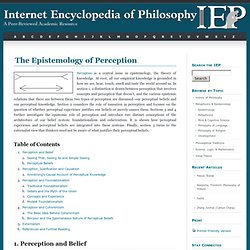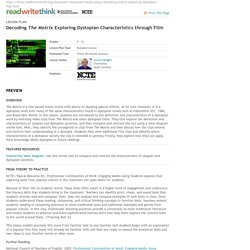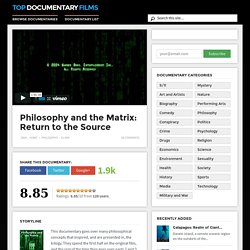

Epistemology of Perception, The Perception is a central issue in epistemology, the theory of knowledge.

At root, all our empirical knowledge is grounded in how we see, hear, touch, smell and taste the world around us. In section 1, a distinction is drawn between perception that involves concepts and perception that doesn’t, and the various epistemic relations that there are between these two types of perception are discussed–our perceptual beliefs and our perceptual knowledge. Section 2 considers the role of causation in perception and focuses on the question of whether perceptual experience justifies our beliefs or merely causes them. Sections 3 and 4 further investigate the epistemic role of perception and introduce two distinct conceptions of the architecture of our belief system: foundationalism and coherentism.
It is shown how perceptual experience and perceptual beliefs are integrated into these systems. Table of Contents 1. A. B. But consider the issue of skepticism. 2. A. 3. A. B. C. What is this a picture of? What Makes You You? When you say the word “me,” you probably feel pretty clear about what that means.

It’s one of the things you’re clearest on in the whole world—something you’ve understood since you were a year old. You might be working on the question, “Who am I?” But what you’re figuring out is the who am part of the question—the I part is obvious. It’s just you. Easy. But when you stop and actually think about it for a minute—about what “me” really boils down to at its core—things start to get pretty weird.
The Body Theory We’ll start with the first thing most people equate with what a person is—the physical body itself. Decoding The Matrix Exploring Dystopian Characteristics through Film. Lesson Plan Preview The Matrix is a fast-paced action movie with plenty of dazzling special effects.

At its core, however, it is a dystopian work with many of the same characteristics found in dystopian novels such as Fahrenheit 451, 1984, and Brave New World. In this lesson, students are introduced to the definition and characteristics of a dystopian work by watching video clips from The Matrix and other dystopian films. They first explore the definition and characteristics of utopian and dystopian societies, and then compare and contrast the two using a Venn diagram online tool. Back to top Interactive Venn Diagram: Use this online tool to compare and contrast the characteristics of utopian and dystopian societies. NCTE's Topical Resource Kit, Professional Communities at Work: Engaging Media-Savvy Students explains that exploring texts from popular culture in the classroom can open doors for students: Further Reading National Council of Teachers of English. 2005.
Standards Venn Diagram. Philosophy and the Matrix: Return to the Source. This documentary goes over many philosophical concepts that inspired, and are presented in, the trilogy.

They spend the first half on the original film, and the rest of the time then goes over parts 2 and 3, with a couple of things on the Animatrix shorts. It consists of clips of aforementioned releases and interviews. It does a good job of informing the audience about the various thoughts, although it would obviously take far longer to go over all the symbolism in them, and one can ask the very appropriate question if something anywhere near that definite and final is even desired, by viewers or the Wachowskis alike.
That does mean that this is limited, but it is likely enough to enlighten and provide food for thought. In line with the series, this may provoke debate, rather than give answers set in stone. Obviously, it also makes a difference if one particularly wants to think about the meanings one could possibly take out of them. Daniel Dennett and Cornel West Decode the Philosophy of The Matrix in 2004 Film. Dennett, Chalmers, the always captivating scholar/theologian/activist Cornel West, and a host of other academic thinkers, appear in the documentary above, Philosophy and the Matrix: Return to the Source.

Part of the sprawling box-set The Ultimate Matrix Collection, the film comments on how The Matrix does much more than dramatize an undergraduate thesis; it takes on questions about religious revelation and authority, parapsychology, free will and determinism, and the nature of personal identity in ways that no dry philosophical text or arcane mystical system has before, thanks to its hip veneer and pioneering use of CGI.
While some of the thinkers above might see more profundity than the movies seem to warrant, it’s still interesting to note how each film glosses the great metaphysical questions that intrigue us precisely because the answers seem forever out of reach. Related Content: The Matrix: What Went Into The Mix.